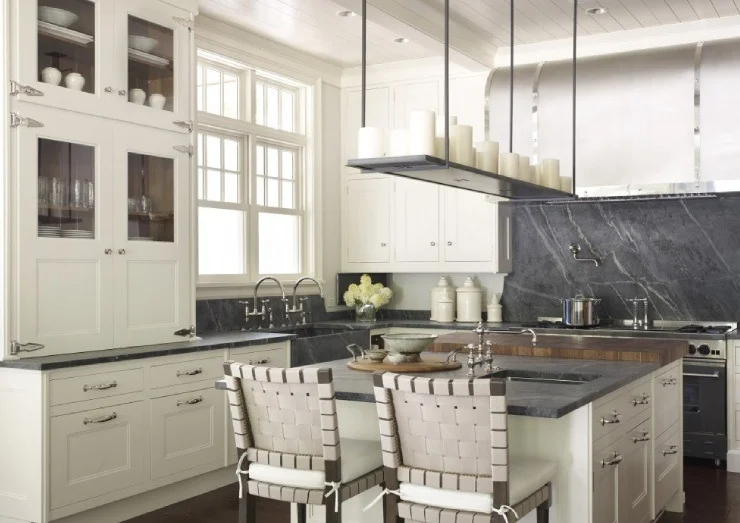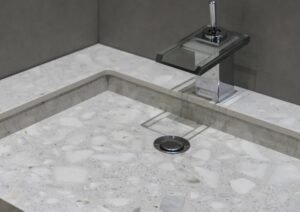Quartz
Quartz is a versatile mineral composed of silicon and atoms (are linked) in a crystal lattice structure. It has various forms and varieties, each has its unique features. Calacatta Crystal Quartz Stone, Crystal Stone Quartz, Mont Blanc Quartz Stone, and Sierra Bedrock Quartz are some of the common varieties of quartz. Stone Quartz New York is one of the most popular choices for countertops and kitchen countertops with mesmerizing designs.
Advantages of Quartz
Quartz offers several benefits over natural stone, making it a popular choice for various applications in homes and commercial spaces.
Here are some of the key advantages of quartz over natural stone: durability, non-porous surface, consistency, wide array of colors, low maintenance, uniformity, environmental impact, price range, and seams and repairs.
- Durability: Quartz is engineered to be incredibly durable, making it resistant to chips, cracks, and scratches. It is less likely to be damaged during daily use compared to some natural stones, which may be more susceptible to wear and tear.
- Non-Porous Surface: Unlike many natural stones, quartz has a non-porous surface. This -means it does not absorb liquids, making it highly resistant to stains from coffee, wine, oils, and other common household substances. It also hinders the growth of bacteria, making it more hygienic and easier to clean.
- Consistency: Since quartz is manufactured, it exhibits a high level of consistency in terms of color, pattern, and texture. This makes it easier to match slabs and create a uniform look in larger installations like kitchen countertops or bathroom walls.
- Wide array of Colors and Patterns: Quartz countertops come in an extensive array of colors and patterns, offering more design versatility compared to some natural stones that may have limited color options.
- Low Maintenance: Due to its non-porous nature, quartz requires minimal maintenance. Regular cleaning with mild soap and water is usually sufficient to keep it looking pristine. It also does not require sealing, which is a common practice with many natural stones.
- Uniformity: Natural stones, such as marble or granite, often have natural variations in veining and color that some homeowners love for their unique character. However, if a more uniform and consistent look is desired, quartz can provide that without the natural variations.
- Environmental Impact: While both natural stone and quartz have environmental impacts in their production processes, some engineered quartz brands use recycled materials and environmentally friendly manufacturing techniques, making them a more sustainable choice in some cases.
- Price Range: While high-end natural stones can be expensive, quartz offers a more predictable price range, making it a more budget-friendly option for those seeking a stunning yet cost-effective countertop or surface material.
- Seams and Repairs: Quartz is more flexible when it comes to seam placement during installation, making it easier for fabricators to create almost invisible seams. Additionally, if any damage occurs, quartz can often be repaired, whereas some natural stones might be more challenging to fix seamlessly.
Disadvantages of Quartz
While quartz offers many advantages, like any material, it also has its disadvantages. Here are some of the notable disadvantages of quartz:
While quartz offers many advantages, like any material, it also has its disadvantages. Here are some of the notable disadvantages of quartz: hear resistance, vulnerability to UV rays, exterior applications, susceptibility to chemical damage, difficult to repair, and limited heat resistance at joints.
- Heat Resistance: While quartz is heat resistant to a certain degree, it is not entirely heatproof. Placing hot pots or pans directly on quartz countertops can cause thermal shock and potentially lead to cracks or discoloration. It’s advisable to use trivets or hot pads to protect the surface from extreme heat.
- Vulnerable to UV Rays: Prolonged exposure to direct sunlight can cause the color of quartz to fade or change over time. This makes it less suitable for outdoor applications or areas with excessive sun exposure.
- Not Suitable for Outdoor Use: Quartz is not recommended for outdoor applications as it may not withstand exposure to the elements, especially extreme temperature variations and UV rays, leading to discoloration and damage.
- Susceptible to Chemical Damage: While quartz is resistant to many household chemicals, harsh chemicals and solvents can still cause damage to the surface. Avoid using abrasive or acidic cleaners, as they may dull or etch the finish.
- Difficult to Repair: While quartz is generally durable, it can still chip or crack under heavy impact. Repairing quartz countertops is challenging and may require professional intervention to achieve a seamless fix.
- Visible Seams: Despite efforts to create inconspicuous seams during installation, larger quartz countertops may still require visible seams, which some homeowners might find less appealing.
- Limited Heat Resistance of Joints: The resins used to bind the quartz can be susceptible to damage from high heat, especially at joints or edges, making it important to use trivets or hot pads to protect these vulnerable areas.
Despite these disadvantages, quartz remains a popular choice for countertops and surfaces due to its aesthetic appeal, durability, and low maintenance requirements. Understanding these limitations can help homeowners make informed decisions and care for their quartz surfaces appropriately to ensure their longevity and beauty.
Explore features, price, and delivery of Stone Quartz from one of the best natural quartz stone manufacturers in New York.




